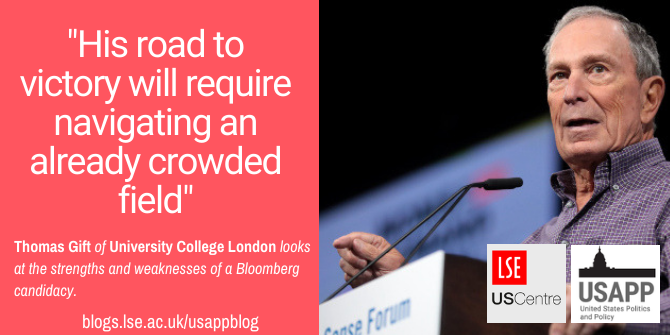 Michael Bloomberg has enjoyed a storied career in business, politics, and philanthropy. Will he soon call the White House home? Amid an already jam-packed field of Democratic presidential candidates, the billionaire businessman and former New York City mayor has indicated that he’s considering a run for the nation’s highest office. Thomas Gift discusses the strengths and weaknesses of a would-be candidate Bloomberg.
Michael Bloomberg has enjoyed a storied career in business, politics, and philanthropy. Will he soon call the White House home? Amid an already jam-packed field of Democratic presidential candidates, the billionaire businessman and former New York City mayor has indicated that he’s considering a run for the nation’s highest office. Thomas Gift discusses the strengths and weaknesses of a would-be candidate Bloomberg.
Last week, Michael Bloomberg filed to run in Alabama’s Democratic primary election next year, fueling speculation that he is preparing for a White House run. Bloomberg has two attributes that enable him to run for president at the eleventh hour: “more money than God” and a household name. The business mogul and former New York City mayor wouldn’t join the Democratic primaries if he didn’t think he could win. But is he right? Here’s a run-down of some strengths and weaknesses of a would-be candidate Bloomberg:
Strengths
- Competence: Bloomberg projects competence, and his independent streak appeals to Democrats who want a leader who emphasizes pragmatism over ideology. His sales pitch will revolve around his ability to solve tough problems. Bloomberg built a financial services and information business from the ground-up and ran New York City with steely-eyed practicality. He can claim that he’s poised to get Washington working again by reaching across party lines.
- Electability: Bloomberg will sell himself as the most electable candidate, which matters to some Democrats who want nothing more than to defeat Trump. Bloomberg will try to convince voters that Biden isn’t the only Democrat who can win over blue-collar, working-class Americans in swing states like Pennsylvania, Ohio, and Wisconsin. It remains to be seen whether there’s a craving for a candidate with socially liberal, economically conservative impulses.
- Command of policy: Bloomberg is moderate, but that doesn’t mean he doesn’t take clear stands on certain issues. Bloomberg has championed several causes that both centrist and progressive Democrats can rally behind. This is especially true on gun control, where Bloomberg funded the Everytown for Gun Safety organization, and on climate change, where in 2019 he committed $500 million to launch the Beyond Carbon initiative.

“Michael Bloomberg” by Gage Skidmore is licensed under CC BY SA 2.0
Weaknesses
- Flip flopping: Bloomberg won’t pass all of the standard partisan litmus tests imposed on Democratic presidential hopefuls—he is, after all, a former Republican. This makes Bloomberg vulnerable to attacks that he’s too moderate to radically rethink today’s biggest policy challenges, including healthcare, poverty, infrastructure, and education. For voters on the left, there’s a fear that Bloomberg would be too quick to compromise with Republicans.
- Out of touch: There’s no getting around it: Bloomberg personifies the 1 percent. Although he can point to his success in business as evidence of his abilities, Bloomberg’s fortune will likely bring up charges that he can’t relate to ordinary Americans. With inequality at the forefront of the Democratic agenda, Senators Warren, Sanders, and other progressives will argue that another billionaire is far from the ideal leader to tackle gaping divides between the rich and poor.
- Late to the party: Winning the Democratic nomination typically means doing well in early primary states like Iowa and New Hampshire. Yet Bloomberg reportedly wouldn’t even plan to compete in these states. Instead, he’d run a “broad-based, national campaign” focused on “Super Tuesday and beyond.” That’s a high-risk strategy that wouldn’t be necessary if he’d mobilized a ground-game earlier in the primary season.
The Bottom Line to a Bloomberg candidacy
If he can earn the Democratic nomination, Bloomberg would be a formidable opponent for Donald Trump. Yet his road to victory will require navigating an already crowded field, including a surging Warren. He also risks splitting the moderate vote with Biden. Despite being a 1 percenter, a former Republican, and a late entrant, it’s not impossible that Bloomberg can win the nomination. But it’s a long road between now and the 2020 Democratic National Convention.
Please read our comments policy before commenting.
Note: This article gives the views of the author, and not the position of USAPP – American Politics and Policy, nor the London School of Economics.
Shortened URL for this post: http://bit.ly/33ASAZz
About the author
 Thomas Gift – University College London
Thomas Gift – University College London
Thomas Gift is a Lecturer of Political Science at UCL, where he teaches on Public Policy Economics and Analysis and is the Director of the Philosophy, Politics, and Economics (PPE) Programme. He is also a Visiting Fellow at the LSE US Centre.






